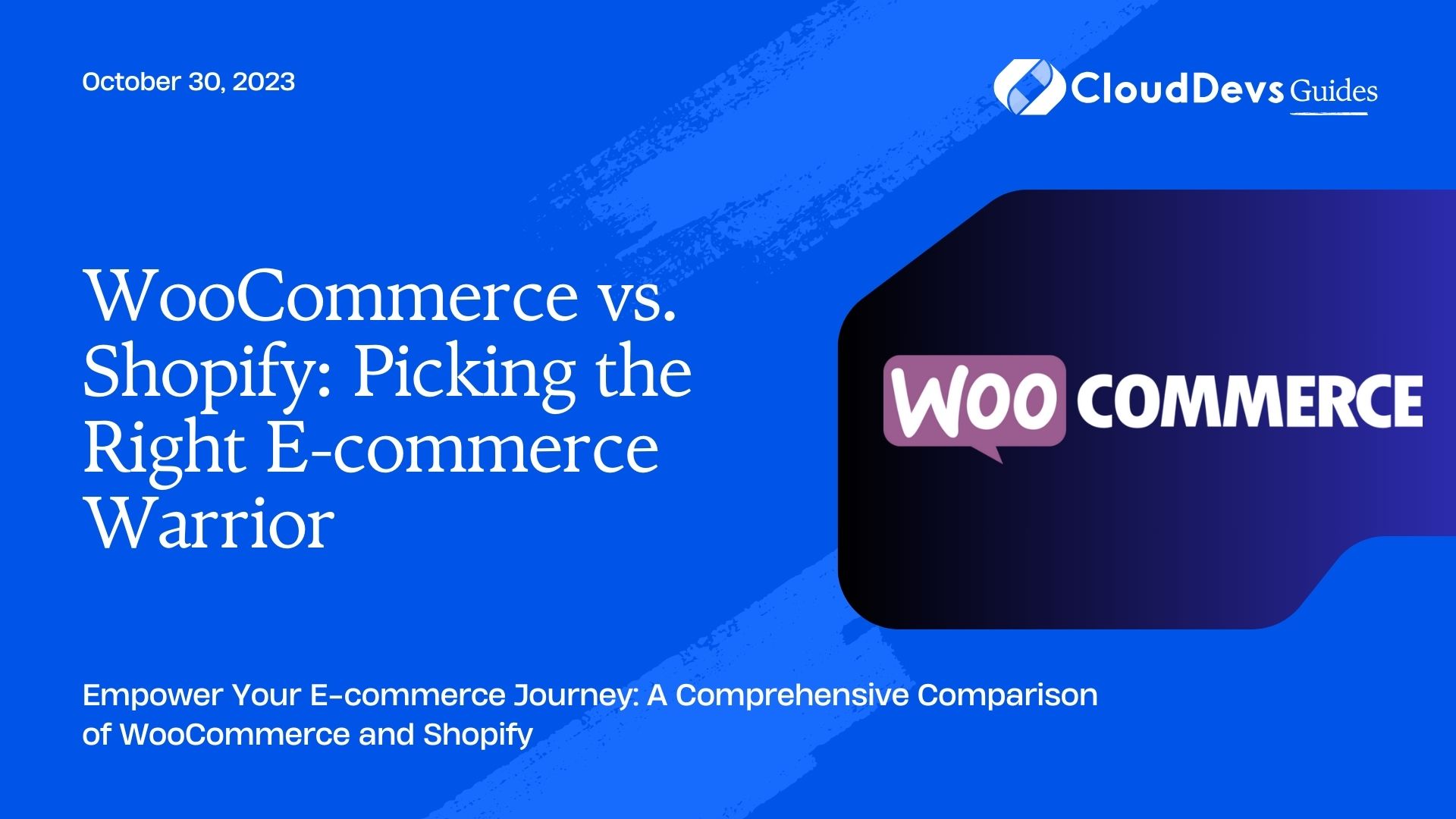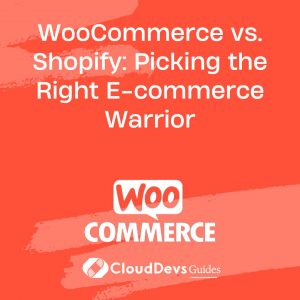WooCommerce vs. Shopify: Picking the Right E-commerce Warrior
In the ever-evolving landscape of e-commerce platforms, choosing the right one for your online store is crucial. WooCommerce and Shopify are two of the most popular and widely used options, each with its own strengths and weaknesses. In this comparison, we’ll delve into the key features, pricing structures, customization options, and more to help you make an informed decision for your e-commerce venture.
Introduction
Before we dive into the details, let’s briefly introduce WooCommerce and Shopify:
WooCommerce: It’s a free, open-source plugin for WordPress, one of the most popular content management systems (CMS) globally. WooCommerce empowers users to add e-commerce functionality to their WordPress websites seamlessly.
Shopify: Shopify is a standalone, hosted e-commerce platform that provides an all-in-one solution for building and running an online store. It’s renowned for its user-friendly interface and ease of use.
Ease of Use
Shopify: When it comes to ease of use, Shopify takes the lead. It’s a fully hosted solution, meaning you don’t have to worry about managing hosting, security, or updates. The user-friendly dashboard allows you to set up your store quickly, add products, and customize the design with minimal technical knowledge. Shopify also offers a user-friendly drag-and-drop builder for creating web pages.
WooCommerce: While WooCommerce is user-friendly, it requires a bit more technical expertise, primarily if you’re not familiar with WordPress. You’ll need to handle hosting and security yourself. However, if you’re comfortable with WordPress, you’ll appreciate the familiarity and flexibility it offers.
Customization
Shopify: Shopify provides a range of pre-designed themes, both free and paid, that you can customize to match your brand. The platform offers a robust theme editor and a theme development environment called “Shopify Theme Kit” for more advanced users. Additionally, you can access the HTML and CSS of your store, giving you complete control over its design.
WooCommerce: WooCommerce offers unlimited customization potential, thanks to its integration with WordPress. You can choose from thousands of free and premium WordPress themes and customize them to suit your needs. The ability to modify code directly gives developers extensive control over the store’s appearance and functionality.
Pricing
Shopify: Shopify’s pricing is straightforward and includes hosting. They offer several plans, starting with the Basic Shopify plan at $29 per month and scaling up to the Advanced Shopify plan at $299 per month. There’s also a Shopify Lite plan for $9 per month, which is suitable for businesses that want to sell on social media or add a “buy” button to an existing website.
WooCommerce: WooCommerce itself is free, but there are associated costs. You’ll need to pay for hosting, a domain name, and potentially premium plugins and themes. The overall cost can vary significantly depending on your hosting provider and the extensions you require. This flexibility can be an advantage if you’re on a tight budget, but it also means you need to manage costs more closely.
Payment Processing
Shopify: Shopify offers its payment gateway, Shopify Payments, which allows you to accept credit card payments without transaction fees. However, if you prefer to use another payment gateway, you’ll incur additional fees on top of Shopify’s standard transaction fees.
WooCommerce: With WooCommerce, you have complete control over your payment gateways. You can choose from various payment processors like PayPal, Stripe, Square, and more. While this flexibility is advantageous, it may require additional setup and possibly transaction fees depending on your chosen payment gateway.
Scalability
Shopify: Shopify is known for its scalability. Whether you’re just starting or experiencing rapid growth, Shopify can accommodate your needs. It offers a range of plans, and you can add more features and capabilities through its extensive app store.
WooCommerce: WooCommerce is also scalable, but it might require more technical expertise to handle growth efficiently. As your store grows, you may need to invest in better hosting, optimize your site, and potentially hire developers for customization and maintenance.
SEO
Shopify: Shopify has built-in SEO features, including customizable title tags, meta descriptions, and URL structures. It also provides a range of SEO apps in its app store to enhance your store’s visibility in search engines.
WooCommerce: WooCommerce leverages the SEO capabilities of WordPress, which is known for its SEO-friendliness. You can use plugins like Yoast SEO to optimize your product pages and content for search engines. This can give you more control and flexibility over your SEO efforts.
Support and Community
Shopify: Shopify offers 24/7 customer support via chat, email, and phone. They also have a robust knowledge base and an active community forum.
WooCommerce: WooCommerce’s support largely depends on the hosting provider you choose. However, there is a vast community of WordPress and WooCommerce users, and you can find solutions to most problems through forums, tutorials, and documentation.
Security
Shopify: Security is a top priority for Shopify. As a hosted solution, they handle most security concerns, including updates and SSL certificates. They also provide a PCI DSS compliant environment for handling credit card data.
WooCommerce: Security is your responsibility when using WooCommerce. You’ll need to ensure your hosting environment is secure, keep WordPress and plugins updated, and implement security measures like SSL certificates and firewalls.
Conclusion
Choosing between WooCommerce and Shopify depends on your specific needs and preferences.
Choose Shopify if:
– You’re looking for a user-friendly, all-in-one solution.
– You want hassle-free hosting and security.
– You’re willing to pay a monthly fee for convenience.
Choose WooCommerce if:
– You prefer complete customization control.
– You’re comfortable with WordPress.
– You want to manage costs more closely and don’t mind handling hosting and security.
Ultimately, both platforms have their strengths, and the right choice for you will depend on your unique business requirements. It’s essential to thoroughly evaluate your options and consider factors such as budget, technical expertise, scalability, and long-term goals when making your decision. Whichever platform you choose, both WooCommerce and Shopify can help you build a successful online store.
Table of Contents







